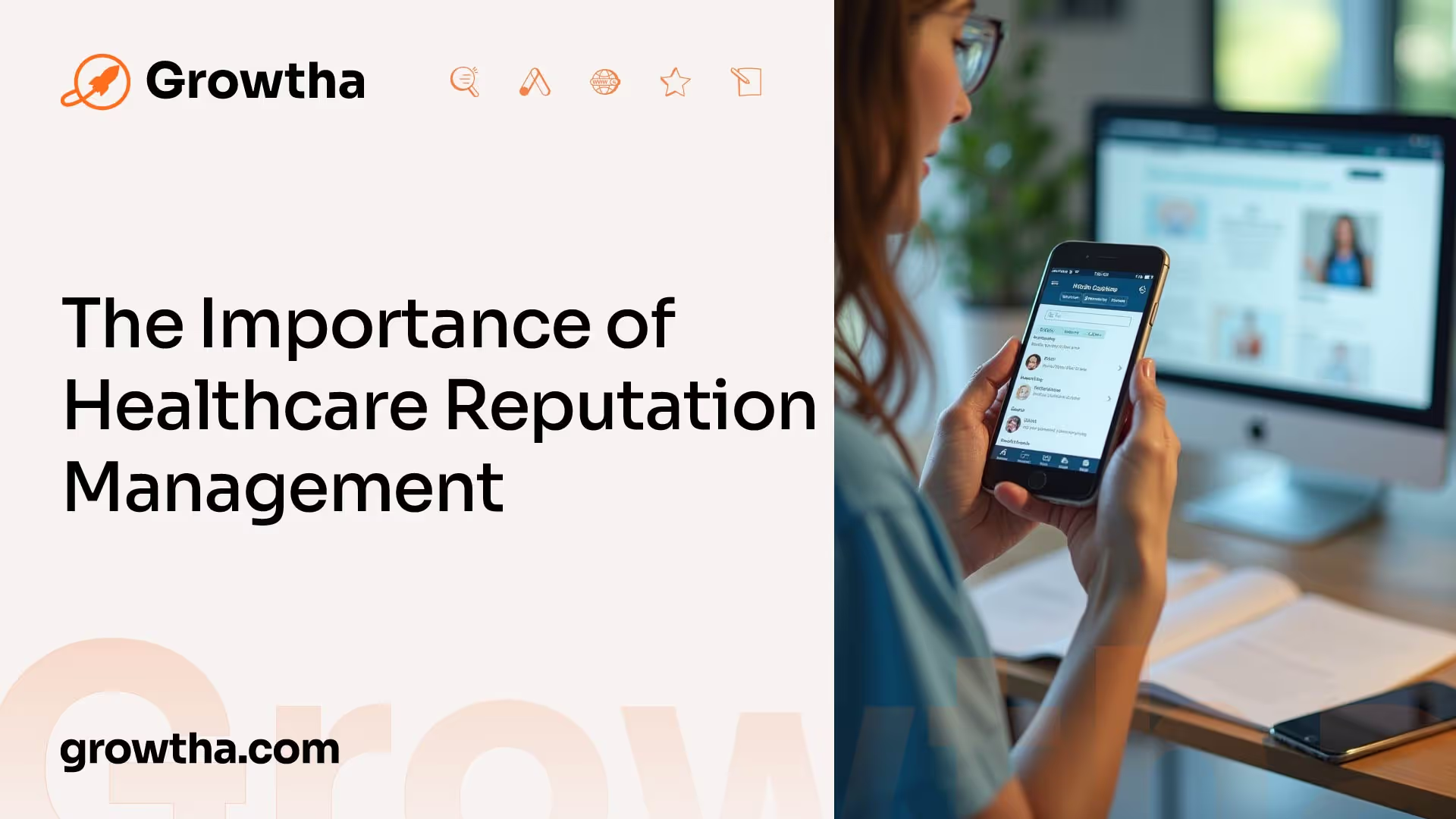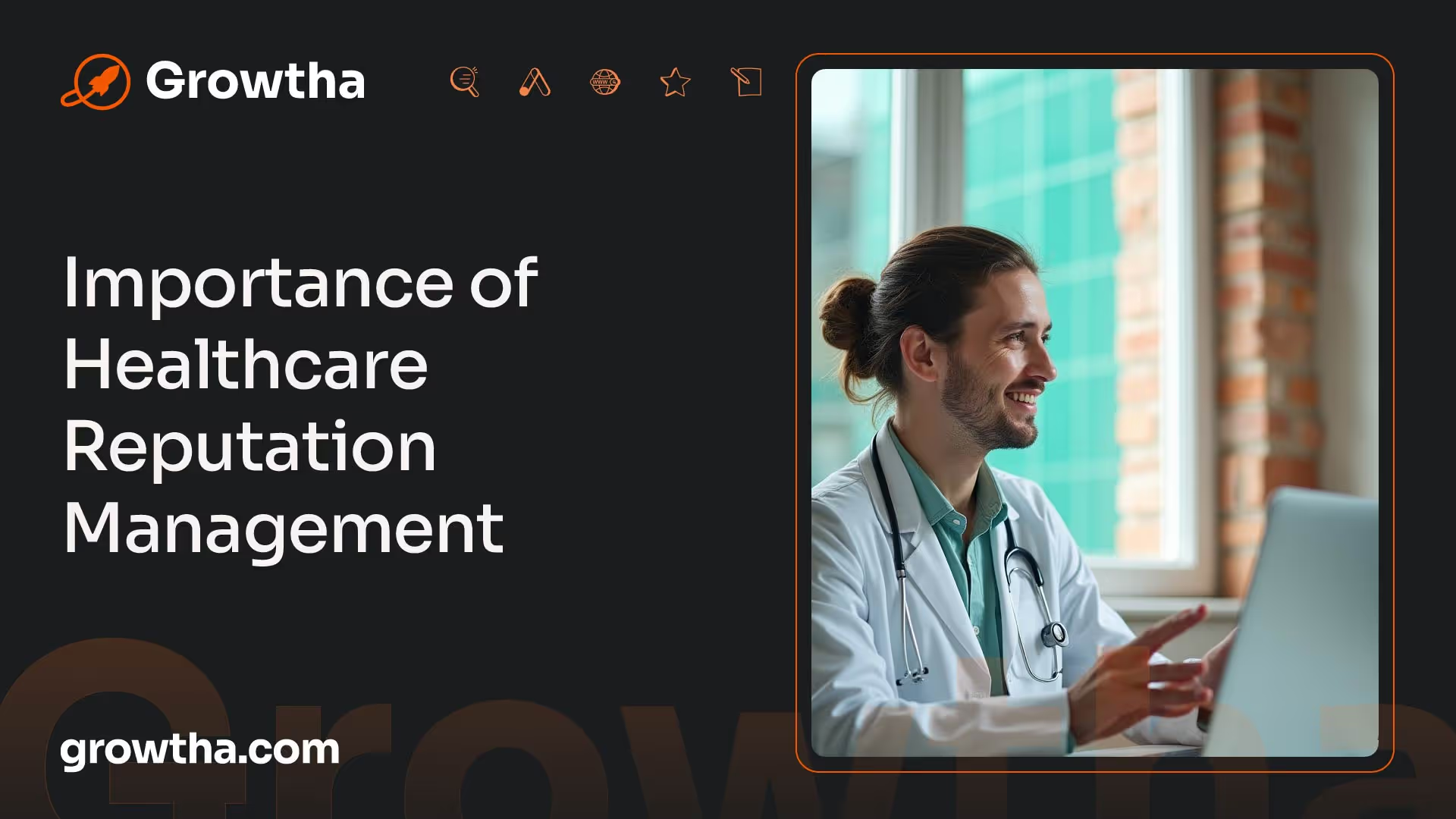The Importance of Healthcare Reputation Management
Managing the reputation of healthcare organizations is vital in maintaining patient trust and satisfaction.


The Importance of Healthcare Reputation Management

Importance of Healthcare Reputation Management
Managing the reputation of healthcare organizations is vital in maintaining patient trust and satisfaction. A positive reputation not only attracts new patients but also fosters loyalty among existing ones. In this section, we will explore two key aspects of healthcare reputation management: enhancing patient satisfaction and leveraging patient feedback.
Enhancing Patient Satisfaction
Patient satisfaction is a crucial component of healthcare reputation management. Satisfied patients are more likely to recommend a healthcare provider to others and speak positively about their experiences. This, in turn, can contribute to the growth and success of a healthcare organization.
To enhance patient satisfaction, healthcare organizations should focus on delivering high-quality care and personalized experiences. This involves providing attentive and compassionate patient care, ensuring clear communication between healthcare providers and patients, and minimizing wait times.
Additionally, healthcare organizations can leverage technology to improve patient satisfaction. For example, automated patient surveys sent via text messages can capture patient experiences in real-time, allowing for quick feedback while the experience is still fresh [1]. This enables healthcare providers to address any concerns promptly and make necessary improvements. By prioritizing patient satisfaction, healthcare organizations can build a strong reputation and foster long-term patient relationships.
Leveraging Patient Feedback
Patient feedback plays a crucial role in healthcare reputation management. Feedback from patients provides valuable information about their experiences, allowing healthcare organizations to identify areas for improvement and address any gaps in care. It helps healthcare providers understand their strengths and areas for growth, supporting continuous learning and professional development [2].
Promptly responding to patient feedback is essential in managing reputation. When patients provide feedback, whether positive or negative, it is important for healthcare organizations to acknowledge and respond accordingly. Responding with empathy and personalization can have a positive impact on a practice's reputation. Simple gestures like addressing patients by their names and showing gratitude for positive reviews can go a long way in building patient trust and loyalty [1].
Monitoring patient feedback trends is also crucial for healthcare organizations. Regularly analyzing feedback allows for a better understanding of gaps in care and enables informed decision-making to enhance patient experience and satisfaction. By paying attention to keywords, scores, and sentiments across providers and locations, healthcare organizations can make data-driven improvements that positively impact their reputation [1].
Effective healthcare reputation management involves leveraging patient feedback to drive continuous improvement and build trust among patients. By actively seeking and responding to patient feedback, healthcare organizations can enhance their reputation, attract new patients, and cultivate long-lasting patient relationships.

Strategies for Healthcare Reputation Management
In the healthcare industry, reputation management plays a crucial role in building trust and attracting patients. Implementing effective strategies can enhance patient satisfaction and improve overall reputation. Here are three key strategies for successful healthcare reputation management:
Automated Patient Surveys
Patient feedback is invaluable for ensuring quality healthcare and patient satisfaction. Healthcare organizations are leveraging automated, post-visit patient surveys sent via text message to capture patient experiences in real-time. These surveys allow patients to provide feedback while the experience is still fresh, ensuring accurate and timely responses.
By using automated surveys, healthcare providers can collect valuable insights and identify areas for improvement. These surveys can cover various aspects of the patient's experience, such as communication, wait times, and overall satisfaction. Analyzing the survey responses helps healthcare organizations understand patient needs and identify trends to enhance their reputation continually.
Prompt Responses to Feedback
Responding to patient feedback promptly is crucial for effective reputation management. When patients take the time to share their experiences, it's important to acknowledge their feedback and address any concerns. Prompt responses demonstrate that healthcare organizations value patient opinions and are committed to providing excellent care.
Ideally, healthcare providers should respond to patient feedback within one business day to prevent negative experiences from escalating. By resolving complaints quickly and effectively, healthcare organizations have the opportunity to turn disgruntled patients into loyal advocates. Simple gestures such as addressing patients by name and showing gratitude for positive reviews can go a long way in building a positive reputation [1].
Monitoring Patient Feedback Trends
Regularly monitoring patient feedback trends is essential for healthcare organizations looking to enhance their reputation. Analyzing keywords, scores, and sentiments across providers, locations, and other relevant factors can provide valuable insights. By tracking patient feedback trends, healthcare providers can identify gaps in care, make informed business decisions, and continually improve the patient experience.
Monitoring patient feedback trends allows healthcare organizations to stay updated on patient expectations and preferences. It helps identify areas where improvements can be made, enabling healthcare providers to address concerns and enhance patient satisfaction. Additionally, tracking trends can help healthcare organizations identify areas of excellence and highlight these strengths in their marketing and reputation management efforts.
Implementing these strategies for healthcare reputation management can significantly impact patient satisfaction and overall reputation. By leveraging automated patient surveys, promptly responding to feedback, and monitoring patient feedback trends, healthcare organizations can continually improve the patient experience and build a strong and positive reputation.

Impact of Smart Technology in Healthcare
Smart technology has revolutionized various aspects of healthcare, offering innovative solutions to improve patient care and outcomes. In this section, we will explore the impact of smart technology in three key areas: heart health research using smart wearables, asthma management through connected inhalers, and the benefits of telehealth services.
Smart Wearables in Heart Health Research
Smart wearables have played a significant role in advancing heart health research. In one notable study conducted by Huawei Technologies, smart wearables were utilized in the world's largest heart-health research project to screen 10 thousand people suspected of having atrial fibrillation. The results showed an impressive 94% accuracy in detecting this common heart condition.
These wearable devices, such as smartwatches and fitness trackers, are equipped with sensors that monitor vital signs like heart rate and rhythm. By continuously tracking these metrics, healthcare professionals can identify potential heart health issues early on, enabling timely interventions and prevention.
Connected Inhalers for Asthma Management
Asthma, a chronic respiratory condition, can be better managed with the help of smart technology. Connected inhalers, also known as smart inhalers, have emerged as a valuable tool in asthma management. These inhalers are equipped with sensors that track medication usage and provide real-time data on inhaler technique, adherence, and environmental triggers.
By analyzing this data, healthcare providers can gain insights into patients' inhaler usage patterns and identify areas for improvement. Studies have shown that smart inhalers have the potential to prevent up to 66% of asthma deaths by monitoring medication usage and providing personalized feedback to patients.
Benefits of Telehealth Services
Telehealth services have witnessed a significant rise in popularity, especially in recent times. Telehealth involves the use of smart technology to deliver healthcare remotely, enabling patients to receive medical consultations and treatment from the comfort of their own homes. This approach offers numerous benefits for both patients and healthcare providers.
According to a study, up to 78% of patients reported feeling satisfied with their telehealth experience, highlighting the convenience and accessibility it offers [3]. Additionally, 68% of physicians express a desire to increase the use of telehealth in their practice. Telehealth services not only reduce the need for physical appointments but also enhance healthcare access for individuals in remote areas or with limited mobility.
By leveraging video consultations, remote monitoring, and digital health platforms, telehealth services enable healthcare professionals to provide timely care, monitor chronic conditions, and offer medical advice without the need for in-person visits. This leads to improved patient outcomes, reduced healthcare costs, and increased overall efficiency in the healthcare system.
The impact of smart technology in healthcare is undeniable, with advancements in wearables, connected inhalers, and telehealth services transforming the way patient care is delivered. As technology continues to evolve, it holds the potential to further enhance healthcare outcomes and improve the overall patient experience.

Role of AI in Healthcare
In the rapidly evolving field of healthcare, artificial intelligence (AI) is playing an increasingly important role. AI has the potential to revolutionize healthcare by improving disease diagnosis and enhancing overall efficiency in healthcare processes.
AI in Disease Diagnosis
One of the significant contributions of AI in healthcare is its ability to assist in disease diagnosis. By utilizing trained AI algorithms, medical professionals can process and analyze large quantities of medical data, leading to more accurate and timely diagnoses.
AI-powered systems can recognize patterns and trends within medical data that may not be easily identifiable by humans alone. This enables healthcare providers to make more informed decisions and develop effective treatment plans. In fact, AI has shown promising results in recognizing and diagnosing certain diseases within test results, significantly increasing the number of patients processed and diagnosed, and reducing wait times [3].
Improving Healthcare Efficiency
AI has the potential to streamline healthcare processes and improve overall efficiency. By automating routine tasks and reducing human error, healthcare providers can focus on delivering high-quality care.
AI-powered chatbots and virtual assistants can provide 24/7 support to patients, answering common questions, scheduling appointments, and providing basic medical advice. This frees up valuable time for healthcare professionals to focus on more complex cases and improve patient care [3].
Machine learning algorithms, a subset of AI, can analyze patient data and predict potential health risks or complications. This early identification allows healthcare providers to intervene promptly and prevent adverse outcomes. Additionally, AI can help optimize resource allocation, such as managing hospital beds and scheduling procedures, to ensure efficient utilization of healthcare resources [3].
The advancements in AI offer great potential to transform the healthcare industry, improving disease diagnosis, enhancing patient care, and optimizing healthcare processes. As AI continues to evolve, it is crucial for healthcare organizations to embrace and integrate this technology to unlock its full benefits.
Tools for Healthcare Reputation Management
When it comes to managing the reputation of healthcare organizations, there are several tools available that can assist in monitoring and enhancing online presence. These tools help in collecting feedback, tracking brand mentions, improving rankings, and managing crises. Let's explore some popular tools for healthcare reputation management:
Reputation.com
Reputation.com is a comprehensive platform designed to help multi-location organizations monitor and enhance their online ratings, reviews, customer service, and other factors. Their Reviews & Review Booster feature enables healthcare organizations to collect feedback, respond to reviews, and automate engagement. By leveraging this tool, healthcare providers can actively manage their online reputation and maintain a positive image. To learn more about their services and pricing, a demo call with their team is required.
Mention
Mention is a real-time reputation monitoring tool that scans over a billion online sources, including social media platforms and blogs. It allows healthcare organizations to track brand mentions, monitor competitors, and stay updated on relevant keywords. This tool provides valuable insights into the online conversations surrounding the organization, enabling proactive reputation management. Mention offers a free trial and flexible subscription plans starting at $41 per month.
Podium
Podium is a review management platform that streamlines the process of gathering feedback from top customers and enhancing rankings on platforms like Google and Facebook. With Podium, healthcare organizations can automate the collection of reviews, respond to feedback, and gain detailed analytics to identify negative and positive trends. This tool empowers healthcare providers to actively manage their online reputation and build trust with their patients. Podium does not offer a free trial, and pricing can be customized after a demo call.
Meltwater
Meltwater provides comprehensive "media intelligence" tracking, allowing healthcare organizations to gain accurate insights into their brand health. This tool helps in monitoring online presence, examining SEO profiles and brand equity, and managing potential crises. By utilizing Meltwater, healthcare providers can proactively identify and address reputation-related issues, ensuring a positive online presence. To learn more about their services and pricing, a demo call with their team is required.
Grade.us
Grade.us is a review management platform that helps healthcare organizations automate the process of improving their reputation. With Grade.us, healthcare providers can monitor and respond to reviews across 100+ review sites, ensuring prompt and effective engagement with patients. This tool enables healthcare organizations to actively manage their online reputation, build trust, and enhance patient satisfaction. Grade.us offers a free trial, and subscription plans start at $110 per seat per month.
By utilizing these reputation management tools, healthcare organizations can effectively monitor their online presence, gather feedback, respond to reviews, and enhance their overall reputation. These tools provide valuable insights and features that enable healthcare providers to actively engage with patients and maintain a positive image in the digital landscape.
Utilizing Online Reviews for Healthcare Organizations
Online reviews have become a vital component in the healthcare industry, influencing the reputation of healthcare organizations. With about 94% of patients relying on online reviews to evaluate healthcare providers, the significance of these reviews cannot be understated [4]. In this section, we will explore the significance of online reviews, the importance of responding to them, and how they contribute to building trust and a positive online reputation.
Significance of Online Reviews
With the increasing reliance on online reviews, they have become a crucial part of a healthcare organization's online ranking factor. Approximately 13% of a search ranking on Google is tied to online reviews [4]. Positive reviews can enhance online visibility, attract more patients, and demonstrate the organization's reputation for care, compassion, and expertise [4].
By providing insights into the patient experience, online reviews help potential patients make informed decisions when selecting healthcare providers. They serve as a valuable source of information about the quality of care delivered, the professionalism of the staff, and the overall patient satisfaction.
Responding to Online Reviews
Responding to online reviews is a critical aspect of healthcare reputation management. It not only shows that the organization values patient feedback but also provides an opportunity to address any concerns and build trust. According to research, 79% of people are more likely to leave a positive online review if a business turns an initially negative experience into a positive one [4].
When responding to online reviews, healthcare organizations should aim to be prompt, professional, and empathetic. Acknowledge the feedback, whether positive or negative, and express gratitude for taking the time to share their experience. In the case of negative reviews, offer a sincere apology and assure the reviewer that their concerns will be addressed. Encourage them to reach out directly to discuss the matter further. Responding in a timely and compassionate manner shows prospective patients that the organization is attentive and committed to patient satisfaction.
Building Trust through Online Reputation
A strong online reputation is crucial for healthcare organizations, as it instills confidence in the abilities of doctors and attracts more patients. By actively managing online reviews and responding to them, healthcare organizations can build trust and credibility. Positive reviews help to reinforce the organization's reputation, while addressing negative reviews demonstrates a commitment to resolving issues and improving the patient experience.
To effectively build trust through online reputation, healthcare organizations should encourage patients to leave reviews and share their positive experiences. They can utilize various communication channels, such as email or social media, to request feedback from patients. Additionally, organizations should regularly monitor online review platforms and engage with patients to show their dedication to patient satisfaction.
By leveraging the significance of online reviews, responding to them in a constructive manner, and actively building trust, healthcare organizations can effectively manage their reputation and attract more patients. A positive online reputation not only enhances visibility but also establishes the organization as a trusted provider of high-quality care.
References
[1]: https://www.providertech.com/6-tips-patient-feedback/
[2]: https://www.ncbi.nlm.nih.gov/pmc/articles/PMC5709796/
[3]: https://www.impactmybiz.com/blog/smart-technology-in-healthcare/
[4]: https://www.medicaleconomics.com/view/online-reviews-are-becoming-more-important-to-patients-in-choosing-their-care-how-to-manage-your-online-reputation-in-health-care







